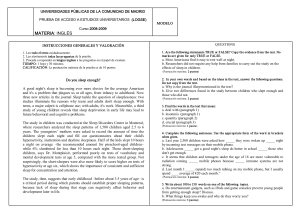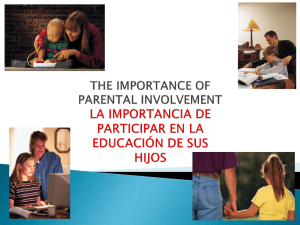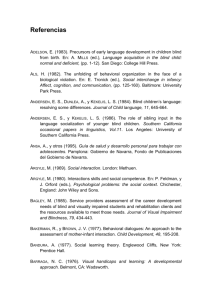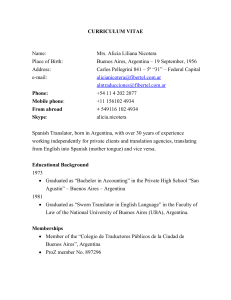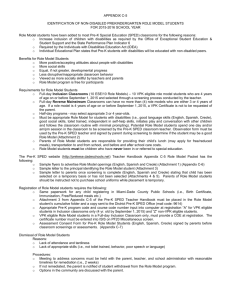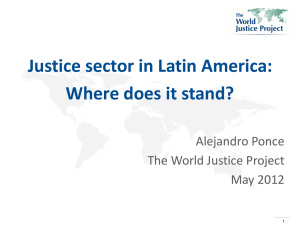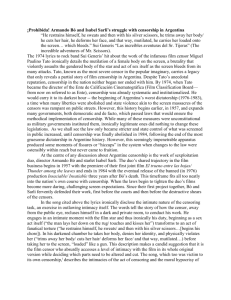ARTICULO DE V. BERLINERBLAU: LINEAMIENTOS FORENSES
advertisement
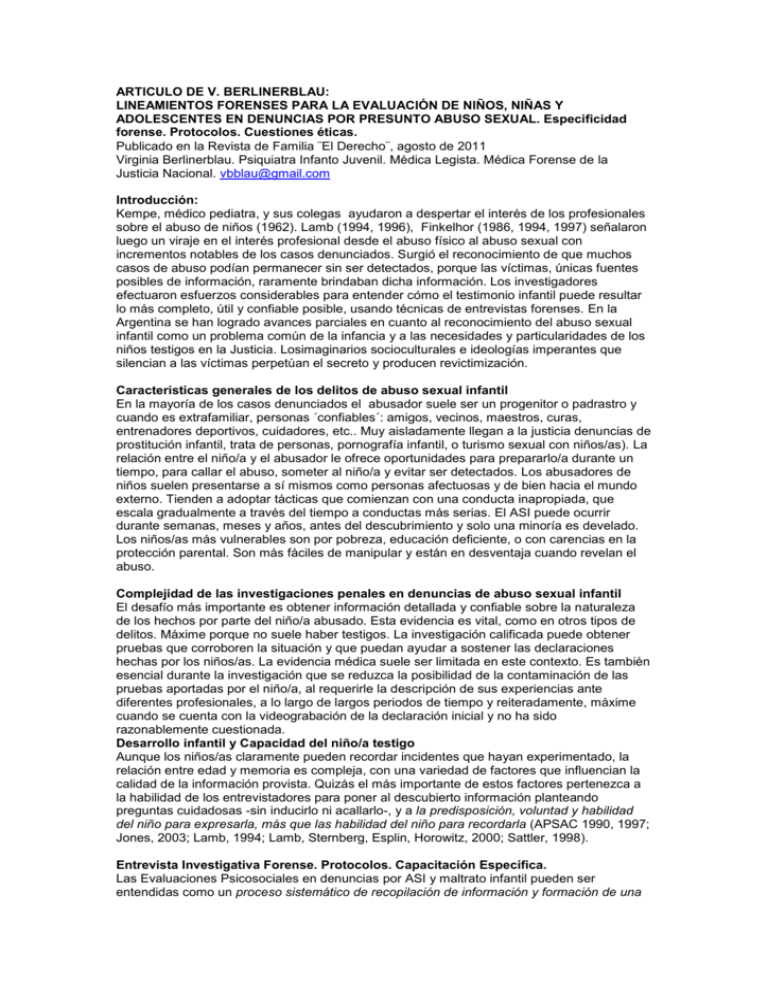
ARTICULO DE V. BERLINERBLAU: LINEAMIENTOS FORENSES PARA LA EVALUACIÓN DE NIÑOS, NIÑAS Y ADOLESCENTES EN DENUNCIAS POR PRESUNTO ABUSO SEXUAL. Especificidad forense. Protocolos. Cuestiones éticas. Publicado en la Revista de Familia ¨El Derecho¨, agosto de 2011 Virginia Berlinerblau. Psiquiatra Infanto Juvenil. Médica Legista. Médica Forense de la Justicia Nacional. vbblau@gmail.com Introducción: Kempe, médico pediatra, y sus colegas ayudaron a despertar el interés de los profesionales sobre el abuso de niños (1962). Lamb (1994, 1996), Finkelhor (1986, 1994, 1997) señalaron luego un viraje en el interés profesional desde el abuso físico al abuso sexual con incrementos notables de los casos denunciados. Surgió el reconocimiento de que muchos casos de abuso podían permanecer sin ser detectados, porque las víctimas, únicas fuentes posibles de información, raramente brindaban dicha información. Los investigadores efectuaron esfuerzos considerables para entender cómo el testimonio infantil puede resultar lo más completo, útil y confiable posible, usando técnicas de entrevistas forenses. En la Argentina se han logrado avances parciales en cuanto al reconocimiento del abuso sexual infantil como un problema común de la infancia y a las necesidades y particularidades de los niños testigos en la Justicia. Losimaginarios socioculturales e ideologías imperantes que silencian a las víctimas perpetúan el secreto y producen revictimización. Características generales de los delitos de abuso sexual infantil En la mayoría de los casos denunciados el abusador suele ser un progenitor o padrastro y cuando es extrafamiliar, personas ´confiables´: amigos, vecinos, maestros, curas, entrenadores deportivos, cuidadores, etc.. Muy aisladamente llegan a la justicia denuncias de prostitución infantil, trata de personas, pornografía infantil, o turismo sexual con niños/as). La relación entre el niño/a y el abusador le ofrece oportunidades para prepararlo/a durante un tiempo, para callar el abuso, someter al niño/a y evitar ser detectados. Los abusadores de niños suelen presentarse a sí mismos como personas afectuosas y de bien hacia el mundo externo. Tienden a adoptar tácticas que comienzan con una conducta inapropiada, que escala gradualmente a través del tiempo a conductas más serias. El ASI puede ocurrir durante semanas, meses y años, antes del descubrimiento y solo una minoría es develado. Los niños/as más vulnerables son por pobreza, educación deficiente, o con carencias en la protección parental. Son más fáciles de manipular y están en desventaja cuando revelan el abuso. Complejidad de las investigaciones penales en denuncias de abuso sexual infantil El desafío más importante es obtener información detallada y confiable sobre la naturaleza de los hechos por parte del niño/a abusado. Esta evidencia es vital, como en otros tipos de delitos. Máxime porque no suele haber testigos. La investigación calificada puede obtener pruebas que corroboren la situación y que puedan ayudar a sostener las declaraciones hechas por los niños/as. La evidencia médica suele ser limitada en este contexto. Es también esencial durante la investigación que se reduzca la posibilidad de la contaminación de las pruebas aportadas por el niño/a, al requerirle la descripción de sus experiencias ante diferentes profesionales, a lo largo de largos periodos de tiempo y reiteradamente, máxime cuando se cuenta con la videograbación de la declaración inicial y no ha sido razonablemente cuestionada. Desarrollo infantil y Capacidad del niño/a testigo Aunque los niños/as claramente pueden recordar incidentes que hayan experimentado, la relación entre edad y memoria es compleja, con una variedad de factores que influencian la calidad de la información provista. Quizás el más importante de estos factores pertenezca a la habilidad de los entrevistadores para poner al descubierto información planteando preguntas cuidadosas -sin inducirlo ni acallarlo-, y a la predisposición, voluntad y habilidad del niño para expresarla, más que las habilidad del niño para recordarla (APSAC 1990, 1997; Jones, 2003; Lamb, 1994; Lamb, Sternberg, Esplin, Horowitz, 2000; Sattler, 1998). Entrevista Investigativa Forense. Protocolos. Capacitación Específica. Las Evaluaciones Psicosociales en denuncias por ASI y maltrato infantil pueden ser entendidas como un proceso sistemático de recopilación de información y formación de una opinión profesional acerca de la fuente y significado de las declaraciones, el comportamiento, pensamiento y emociones y otras pruebas que son la base de la preocupación por un posible abuso sexual a un niño/a. No hay una práctica única ni estandarizada, aunque recientes estudios sostienen las ventajas de usar para las Entrevistas en la Investigación de Víctimas de Abuso Sexual el Protocolo del N.I.C.H.D. Se trata de una entrevista estructurada al niño/a presunta víctima (Orbach et al., 2000), cuya metodología se basada en un enfoque gradual, siendo clave la creación de una relación de confianza entre el entrevistador/a forense y el niño/a. En un entorno físico y un clima que facilite la comodidad del niño, se propiciará a través de una serie de comentarios y preguntas de final abierto, que el niño/a describa en sus propias palabras exactamente lo que le ha sucedido. Cuando la fase de relato libre ha concluido, el entrevistador/a puede realizar preguntas aclaratorias –focalizadas y específicaspara expandir y clarificar detalles, y luego pasar a tópicos más livianos para facilitar la transición a la salida. Los procedimientos de entrevista pueden modificarse en casos de niños/as muy pequeños, con mínimas habilidades verbales, o niños/as con problemas especiales. Si la entrevista de declaración testimonial no arrojó ningún resultado y persiste la preocupación por posibilidad de abuso sexual, debería preguntársele directamente al niño/a acerca de la posibilidad de abuso sexual para responder a la pregunta legal y evaluar riesgo de revictimización. Las preguntas coercitivas o intimidantes nunca están justificadas. Se debe cumplir con todas las pautas legales y reconocerse que las entrevistas forenses son parte y no sinónimo de la investigación judicial. El profesional forense debe estar específica y formalmente capacitado, tener experiencia en realizar evaluaciones forenses y en proveer testimonio experto, caso contrario la supervisión es esencial. Ponderación de información colateral. Consideración de Hipótesis alternativas. La revisión de los materiales considerados relevantes es fundamental: antecedentes del expediente, entrevistas colaterales con el cuidador primario no ofensor, etc.. El evaluador/a debe abordar la evaluación con una mentalidad abierta, teniendo en cuenta que todas las fuentes de información tienen limitaciones y pueden contener imprecisiones. Debe considerar hipótesis alternativas plausibles, la posibilidad de denuncias falsas (inventos deliberados), erróneas (equivocadas aunque de buena fe), o insustanciadas (aquellas en las que el nivel de la evidencia fue considerada insuficiente, lo que dependiendo del criterio de quien juzga el caso). La invstigación sostiene que el número de falsas denuncias intencionales es considerablemente menor que el número de casos infundados o no sustanciados. Informe forense. Recomendaciones. Necesidad de revisiones. Cuestiones éticas. El informe de evaluación debería reflejar una revisión objetiva de la información colateral confiable utilizada. La documentación escrita y claramente redactada es el requisito mínimo, incluyendo las citas literales entrecomilladas de las preguntas y respuestas significativas (verbales y no verbales). La videograbación de la declaración testimonial al inicio es la práctica preferida para evitar el deterioro de los recuerdos y las influencias del entorno. La entrevista/ evaluación puede ser no concluyente. Si es así, el evaluador debería consignar la información que es motivo de preocupación persistente, pero que no permite afirmar o descartar el abuso. Deberían efectuarse recomendaciones psicoterapéuticas o con relación al entorno del niño, respecto de la conducta y estado emocional y para garantizar la seguridad del niño. Hoy en día se reconocen numerosas secuelas emocionales a largo plazo que son frecuentemente devastadoras. Los procedimientos deben ser regularmente supervisados y revisados con el objeto de identificar oportunidades de ajustes y mejoras. Credibilidad del testimonio infantil Los factores que influencian favorablemente la credibilidad -la veracidad y precisión del niño/a- incluyen el conocimiento sexual inapropiado para la edad, el relato efectuado con espontaneidad, en el lenguaje propio de los niños/as y desde el punto de vista infantil, la descripción detallada (aunque debe tenerse en cuenta que los niños/as pequeños típicamente proveen relatos incompletos y breves, con pocos detalles), relato consistente y mantenido básicamente en el tiempo, relato de la historia por partes, más que toda de una vez, relato verosímil: la historia es plausible y físicamente posible, estado afectivo congruente con lo explicitado (aunque puede haber muchos motivos por los que un niño/a esté enojado, triste o manifieste disociación afectiva), estilo cándido, tal como el hacer correcciones espontáneas, admitiendo que hay detalles que no puede recordar, comparación de la historia de los síntomas y conducta del niño/a favorable con el contenido de la entrevista, descripción de circunstancias típicas de una situación de abuso sexual (amenaza, presión, seducción, coerción, secreto), descripción de la experiencia subjetiva, entre otros.Es fundamental considerar la producciones del niño por sí mismas y también si particularmente hay una historia previa de abuso sexual para aclarar los diferentes casos. Conclusiones En por presunto abuso sexual infantil, es esencial que se definan objetivos claros y se revisen y adopten prácticas y procedimientos que mejoren la eficacia de las investigaciones: reducir el trauma experimentado por el niño/a víctima y obtener un testimonio eficaz de niños/as testigos, proveyendo que los sistemas y procedimientos permitan a los niños/as tener los mismos derechos a la justicia como los adultos víctimas. Los roles yresponsabilidades en el ámbito penal debe ser interrogada, tanto a nivel individual, institucional, gubernamental u otras. Finalmente, la adhesión a protocolos y buenas prácticas garantiza además los derechos del imputado al proveer un marco de referencia y mejorar la actuación profesional. Bibliografía American Professional Society on the Abuse of Children. Guidelines for Psychosocial Evaluation of Suspected Sexual Abuse in Young Children, (1998) Chicago, IL. Berlinerblau Virginia. El Backlash y el abuso sexual infantil. (2003) Rev. S. A.G.I.J. Vol. 10. Núm. 2. Berlinerblau V., Butler T., Diaz Z., Freedman D., Nino M., Pinto G., Pzellinsky R., Terragni M.. Guía de Buenas Prácticas para el abordaje judicial de NNyA víctimas o testigos de violencia, abuso sexual y otros delitos. UNICEF y A.D.C. Versión preliminar (2010). Buenos Aires, Argentina. Cohen E. Raquel, MD, MPH. Proceso de Investigación en Casos de Abuso Sexual Infantil. (2011). Finkelhor D.. Abuso Sexual Infantil. 1984. Editorial Pax México. Giberti (Dirección). Incesto Paterno- Filial. (1998). Una visión multidisciplinaria. Editorial Universidad. Hewitt S. K. Assesing Allegations of Sexual Abuse in Preschool Children. Understanding Small Voices. (1999). IVPS. Sage Publications. Intebi, Irene. Proteger, Reparar, Penalizar. Evaluación de las sospechas de abuso sexual infantil. (2011). Editorial Granica. Juárez López R.J. Evaluación de la credibilidad: criterios y problemática. 2008 http://www20.gencat.cat/docs/Justicia/Documents/ARXIUS/Juarez.pdf Kempe H. C.; F. N. Silverman, B. F. Steele, W. Droegemueller, H. K. Silver. The BatteredChild Syndrome. (1962) JAMA. Doi: 10.1001/jama.1962.03050270019004. Lacombe Elena. Comunicaciones personales (1993 a la fecha). Lamb M. E., Hershkowitz I., Orbach Y. and E. P. W. (2008). Tell Me What Happened. Wiley Editions. Myers J. E. B. (2011) The APSAC Handbook on CHILD MALTREATMENT, 3 Ed. Sage Publications. Myers J. E. B. Legal Issues in Child Abuse and Neglect Practice, Sec. Edition. Sage Publications. 1998. Curriculum dr. THOMAS Lyon Dr. en Psicología y especialista en abuso sexual infantil, que en esta oportunidad hace una Adaptación del Protocolo de la entrevista investigativa del NICHD, es decir un protocolo de Entrevista Investigativa que es considerado actualmente el mejor Procotolo de Entrevista Forense a la fecha para entrevistar niños/as en denuncias de ASI y de Maltrato Infantil. El curriculum del Dr. Thomas Lyon (doctor en psicología, USA): Work Experience Dr. Lyon: Judge Edward J. and Ruey L. Guirado Chair in Law and Psychology, University of Southern California, 2008Professor of Law & Psychology, University of Southern California, 2005-2007; Professor, University of Southern California Law School, 2000-2004; Assistant Professor, 1995-2000. Research Associate, Harbor-UCLA Medical Center, January, 1994-September, 1996. Attorney, Children's Services Division, Los Angeles County Counsel, 1987-1995 Education: Ph.D. Psychology, Stanford University, June, 1994 Advisor: John F. Flavell Dissertation: Young Children’s Understanding of Desire and Knowledge (received the American Psychology Association Division 7 Award for Outstanding Dissertation in Developmental Psychology, 1995) J.D., Harvard Law School, magna cum laude, June, 1987 B.A. English, Dartmouth College, magna cum laude, June, 1983 Editorial Experience: Associate Editor, Psychology, Public Policy, & Law, 2012Associate Editor for Legal Issues, American Professional Society on the Abuse of Children Advisor, 1995-2001, 2007-. Guest Reviewer: American Psychologist; Applied Cognitive Psychology, British Journal of Developmental Psychology; British Journal of Psychology; Child Abuse & Neglect; Children and Youth Services Review; Child Development; Child Maltreatment; Developmental Psychology; Developmental Science; Guilford Press; Journal of Aggression, Maltreatment, and Trauma; Journal of Applied Social Psychology; Journal of Experimental Child Psychology; Journal of Interpersonal Violence; Journal of Personality and Social Psychology; Journal of Trauma and Dissociation; Law & Human Behavior; Law & Social Inquiry; Law & Society Review; Monographs of the Society for Research in Child Development; National Science Foundation; Natural Sciences and Engineering Research Lyon p. 2 Council of Canada; New Criminal Law Review; Oxford University Press; Psychology, Public Policy, & Law; Sage Publications; Trames (Estonian Academy of Sciences); Trauma, Violence, and Abuse. Scientific and Professional Organizations: American Professional Society on the Abuse of Children (Member of the Board of Directors, 1995-2002; Chair of the Legal Subcommittee, 1995-2002; Member, APSAC Task Force on Reactive Attachment Disorder, 2004; Recipient of the William Friedrich Memorial Award, 2008) American Psychological Association (President, Child Maltreatment Section, Division of Youth and Family Services, 2003-2004; Chair, APA Task Force on Developmental Psychology and the Child Witness) American Psychological Society Society for Research in Child Development Research Grants: 6. Lyon, T.D., Principal Investigator, Rizzo, A., & Talbot, T. (Co-Investigators) (8/1/20127/31/2013). Investigative Child Interviewing: Learning through Interaction with a Virtual Child. USC Zumberge Interdisciplinary Grant ($49,941). 5. Lyon, T.D., Principal Investigator (6/10/2011-3/31/2016). Facilitating Maltreated Children’s Honesty (HD047290). National Institute of Child Health and Development, National Institutes of Health ($1,951,647). 4. Lyon, T.D., Principal Investigator (5/1/2006-6/10/2011). Child Maltreatment and Honesty (HD047290). National Institute of Child Health and Development, National Institutes of Health ($1,741,998). 3. Friedman, W.J., & Lyon, T.D., Co-Principal Investigators (8/1/2003-7/31/2006). RUI Collaborative Research: The Development of Memory for Temporal Information (0241586). National Science Foundation ($239,929). 2. Lyon, T.D., Koverola, C., & Heger, A. (1999). Children’s Disclosure of Sexual Abuse. Interdisciplinary Grant; James H. Zumberge Faculty Research and Innovation Fund ($24,999). 1. Saywitz, K.J., & Lyon, T.D., Co-Principal Investigators (1994-1996). Sensitively Assessing Children's Testimonial Competence. National Center on Child Abuse and Neglect, Department of Health and Human Services ($200,000). Training Grants: 2. Lyon, T.D. & Vaclavik, K. (2002-2004). Legal Assistance for Victims Grant Program. Office of Violence Against Women, United States Department of Justice ($394,758). 1. Lyon, T.D. & Vaclavik, K. (2002-2004). Helping Families Break the Cycle of Domestic Violence. The California Endowment ($303,333). Publications in Peer-reviewed Journals 28. Wandrey, L., Quas, J.A., & Lyon, T.D. (2012). Does valence matter? Effects of negativity on children's early understanding of truths and lies. Journal of Experimental Child Psychology, 113, 295-303. 27. Lyon, T.D., Carrick, N., & Quas, J.A. (in press). Right and righteous: Children's incipient understanding of true and false statements. Journal of Cognition and Development. 26. Lyon, T.D., Scurich, N., Choi, K., Handmaker, S., & Blank, R. (2012). “How did you feel?” Increasing child sexual abuse witnesses’ production of evaluative information. Law & Human Behavior, 36, 448-457. 25. Wandrey, L., Lyon, T.D., Quas, J.A., & Friedman, W.F. (2012). Maltreated children’s ability to estimate temporal location and numerosity of placement changes and court visits. Psychology, Public Policy, and Law, 18, 79-104. 24. Lyon, T.D., Ahern, E.C., & Scurich, N. (2012). Interviewing children vs. tossing coins: Accurately assessing the diagnosticity of children’s disclosures of abuse. Journal of Child Sexual Abuse, 21, 19-44. 23. Evans, A.D., & Lyon, T.D. (2012). Assessing children’s competency to take the oath in court: The influence of question type on children’s accuracy. Law & Human Behavior, 195205. 22. Ahern, E. C., Lyon, T. D., & Quas, J. A. (2011). Young children’s emerging ability to make false statements. Developmental Psychology, 47, 61-66. 21. Lyon, T.D., Ahern, E.A., Malloy, L.A., & Quas, J.A. (2010). Children’s reasoning about disclosing adult transgressions: Effects of maltreatment, child age, and adult identity. Child Development, 81, 1714-1728. 20. Carrick, N., Quas, J.A., & Lyon, T.D. (2010). Maltreated and Nonmaltreated Children’s Evaluations of Emotional Fantasy. Child Abuse & Neglect, 34, 129-134. 19. Lyon, T.D., Carrick, N., & Quas, J.A. (2010). Young Children’s Competency to Take the Oath: Effects of Task, Maltreatment, and Age. Law & Human Behavior, 34, 141- 149. 18. Evans, A.D., Lee, K., & Lyon, T.D. (2009). Complex questions asked by defense lawyers but not prosecutors predicts convictions in child abuse trials. Law & Human Behavior, 33, 258-264. 17. Quas, J.A., Wallin, A.R., Horwitz, B., Davis, E., & Lyon, T.D. (2009). Maltreated children’s understanding of and emotional reactions to dependency court involvement. Behavioral Sciences & the Law, 27, 97-117. 16. Lyon, T.D., Malloy, L.C., Quas, J.A., & Talwar, V. (2008). Coaching, truth induction, and young maltreated children’s false allegations and false denials. Child Development, 79, 914929. 15. Lyon, T.D., & Dorado, J.S. (2008). Truth induction in young maltreated children: The effects of oath-taking and reassurance on true and false disclosures. Child Abuse & Neglect, 32, 738-748. 14. Malloy, L.C., Lyon, T.D., & Quas, J.A. (2007). Filial dependency and recantation of child sexual abuse allegations. Journal of the American Academy of Child and Adolescent Psychiatry, 46, 162-170. 13. Lyon, T.D., & Saywitz, K.J. (2006). From post-mortem to preventive medicine: Next steps for research on child witnesses. Journal of Social Issues, 62, 833-861. 12. Malloy, L.C., & Lyon, T.D. (2006). Caregiver support and child sexual abuse: Why does it matter? Journal of Child Sexual Abuse, 15, 97-103. 11. Chaffin, M., Hanson, R., Saunders, B. E., Nichols, T., Barnett, D., Zeanah, C. Berliner, L., Egeland, B., Newman, E., Lyon, T., Letourneau, E., Miller-Perrin, C. (2006). Report of the APSAC task force on attachment therapy, Reactive Attachment Disorder, and attachment problems. Child Maltreatment, 11, 76-89. 10. Friedman, W.J., & Lyon, T.D. (2005). The Development of Temporal- Reconstructive Abilities. Child Development, 76, 1202-1216. 9. Freyd, J.J., Putnam, F.W., Lyon, T.D., Becker-Blease, K.A., Cheit, R.E., Siegel, N.B., & Pezdek, K. (2005). The problem of child sexual abuse: Response. Science, 309, 1183-1184. 8. Freyd, J.J., Putnam, F.W., Lyon, T.D., Becker-Blease, K.A., Cheit, R.E., Siegel, N.B., Lyon p. 5 & Pezdek, K. (2005). The science of child sexual abuse. Science, 308, 501. 7. Kendall-Tackett, K., Lyon, T., Taliaferro, G., & Little, L. (2005). Why child maltreatment researchers should include children’s disability status in their maltreatment studies. Child Abuse & Neglect, 29, 147-151. 6. Lyon, T.D., Saywitz, K.J., Kaplan, D.L., & Dorado, J.S. (2001). Reducing maltreated children’s reluctance to answer hypothetical oath-taking competency questions. Law & Human Behavior, 25, 81-92. 5. Lyon, T.D., & Saywitz, K.J. (1999). Young maltreated children’s competence to take the oath. Applied Developmental Science, 3, 16-27. 4. Kato, P.M., Lyon, T.D., & Rasco, C. (1998). Reasoning about moral aspects of illness and treatment by preschoolers who are healthy or have a chronic illness. Journal of Developmental and Behavioral Pediatrics, 19, 68-76. 3. Lyon, T.D. (1995). False allegations and false denials in child sexual abuse. Psychology, Public Policy, & Law, 1, 429-437. 2. Lyon, T.D., & Flavell, J.F. (1994). Young children's understanding of "remember" and "forget." Child Development, 65, 1357-1371. 1. Lyon, T.D., & Flavell, J.F. (1993). Young children's understanding of forgetting over time. Child Development, 64, 789-800. Publications in Law Reviews 8. Lyon, T.D., & Dente, J. (2013). Child witnesses and the Confrontation Clause. Journal of Criminal Law & Criminology, 102, 1181-1232. 7. Lyon, T.D., & LaMagna, R. (2007). The history of children’s hearsay: From Old Bailey to post-Davis. Indiana Law Journal, 82, 1029-1058. 6. Lyon, T.D. (2002). Applying suggestibility research to the real world: The case of repeated questions. Law & Contemporary Problems, 65, 97-126. 5. Lyon, T.D. (2000). Child witnesses and the oath: empirical evidence. University of Southern California Law Review, 73,1017-1074. 4. Lyon, T.D. (1999). The new wave of suggestibility research: A critique. Cornell Law Review, 84, 1004-1087. 3. Lyon, T.D., & Koehler, J.J. (1996). The relevance ratio: Evaluating the probative value of expert testimony in child sexual abuse cases. Cornell Law Review, 82, 43-78. 2. Lyon, T.D., Gilles, E., & Cory, L. (1996). Medical evidence of physical Abuse in Infants and Young Children, 28, 93-167. 1. Lyon, T.D. (1987). Sexual exploitation of divorce clients: The lawyer's prerogative? Harvard Women's Law Journal, 10, 159-201. Publications in Books 16. Lyon, T.D. (in press). Child witnesses and imagination: Lying, hypothetical reasoning, and referential ambiguity. In M. Taylor (Ed.), The Oxford Handbook of the Development of Imagination. New York: Oxford. 15. Lyon, T.D. (2011). Assessing the competency of child witnesses: Best practice informed by psychology and law. In M.E. Lamb, D. La Rooy, L.C. Malloy, & C. Katz (Eds.), Children’s Testimony: A Handbook of Psychological Research and Forensic Practice (pp. 69-85). Sussex, UK: Wiley-Blackwell., 14. Lyon, Thomas D. (2010). Investigative interviewing of the child. In D.N. Duquette & A.M. Haralambie (Eds.) Child Welfare Law and Practice (2d Ed.) (pp. 87-109). Denver, CO: Bradford. (Reprinted in CAPSAC (California Professional Society on the Abuse of Children) Consultant, Fall, 2011, 1-12.) 13. Saywitz, K.J., Lyon, T. D., & Goodman, G.S. (2011). Interviewing Children. In J.E.B. Myers (Ed.), The APSAC handbook on child maltreatment (3d ed.) (pp. 337-360). Newbury Park, CA: Sage. 12. Lyon, T.D., & Ahern, E.C. (2011). Disclosure of child sexual abuse. In J.E.B. Myers (Ed.), The APSAC handbook on child maltreatment (3d. ed.) (pp. 233-252). Newbury Park, CA: Sage. 11. Lyon, T.D. (2009). Abuse disclosure: What adults can tell. In Bottoms, B. L., Goodman, G. S., & Najdowski, C. J. (Eds.), Child victims, child offenders: Psychology and law (pp. 19-35). New York: Guilford. 10. Lyon, T.D. (2007). False denials: Overcoming methodological biases in abuse disclosure research. In M.E. Pipe, M. E. Lamb, Y. Orbach, and A.C. Cederborg (Eds.), Disclosing abuse: Delays, denials, retractions and incomplete accounts (pp. 41-62). Mahwah, NJ: Erlbaum. 9. Lyon, T.D., & Mechanic, M.D. (2006). Domestic violence and child protection: Confronting the dilemmas in moving from family court to dependency court. In N.E. Dowd, D.G. Singer, & R.F. Wilson (Eds.), Handbook of children, culture, and violence (pp. 21-38). Thousand Oaks, CA: Sage. 8. Lyon, T.D. (2005). Speaking with children: Advice from investigative interviewers In P.F. Talley (Ed.), Handbook for the treatment of abused and neglected children (pp. 6582). Binghamton, NY: Haworth. (Reprinted in Lyon, T.D. (2005). Child development, competence, and credibility: The latest research. In A.G. Donnelly (Ed.), State of the Art Advocacy for Children, Youth, and Families (pp. 29-44). Denver, CO: National Association of Counsel for Children.) 7. Lyon, T.D. (2002). Expert testimony on the suggestibility of children: Does it fit? In Bottoms, B.L., Kovera, M.B., & McAuliff, B.D. (Eds.), Children, social science, and the law (pp. 378411). New York: Cambridge. 6. Lyon, T.D. (2002). Child witnesses and the oath. In Westcott, H.L., Davies, G.M., & Bull, R.H.C. (Eds.), Children's testimony: A handbook of psychological research and forensic practice (pp. 245-260). West Sussex, U.K.: Wiley. 5. Lyon, T.D. (2002). Scientific Support for Expert Testimony on Child Sexual Abuse Accommodation In J.R. Conte (Ed.), Critical issues in child sexual abuse (pp. 107-138). Newbury Park, CA: Sage. 4. Saywitz, K.J., Goodman, G.S., & Lyon, T.D. (2002). Interviewing children in and out of court: Current research and practice implications. In J. Myers, L. Berliner, J. Briere, C.T. Hendrix, C. Jenny, & T. Reid (Eds.), The APSAC Handbook on Child Maltreatment (2d Ed., pp. 349-377). Thousand Oaks, CA: Sage. 3. Saywitz, K.J., & Lyon, T.D. (2002). Coming to grips with children’s suggestibility. In M. Eisen, G. Goodman, & J. Quas (Eds.), Memory and suggestibility in the forensic interview (pp. 85-113). Hillsdale, NJ: Erlbaum. 2. Lyon, T.D. (1999). Are battered women bad mothers? Rethinking the termination of abused women’s parental rights for failure to protect. In H. Dubowitz (Ed.), Neglected children: Research, practice, and policy (pp. 237-260). Newbury Park, CA: Sage. 1. Lyon, T.D., & Koehler, J.J. (1998). Where researchers fear to tread: Interpretive differences among testifying experts in child sexual abuse cases. In S.J. Ceci & H. Hembrooke (Eds.), Expert witnesses in child abuse cases: What can and should be said in court (pp. 249-263). Washington, DC: American Psychological Association. Short Pieces 11. Lyon, T.D. (2012). Twenty-five years of interviewing research and practice: Dolls, diagrams, and the dynamics of abuse disclosure. APSAC (American Professional Society on the Abuse of Children) Advisor, 24(1-2), 14-19. 10. Lyon, T.D. (2009). Witnesses, Children as legal. In R.A. Shweder, T.R. Bidell, A.C. Dailey, S.D. Dixon, P.J. Miller, & J. Modell (Eds.), The child: An encyclopedic companion (pp. 1036-1039). Chicago: University of Chicago Press. 9. Lyon, T.D., Lamb, M.E., & Myers, J.E.B. (2009). [Legal and psychological support for the NICHD interviewing protocol.] Author’s response to Vieth (2008). Child Abuse & Neglect, 33, 71-74.HH 8. Lyon, T.D. (2008, Fall). The Supreme Court, hearsay, and Crawford: Implications for child interviewers. APSAC (American Professional Society on the Abuse of Children) Advisor, 20(3-4), 2-6. 7. Lyon, T.D. (2004, Spring). The Supreme Court and reluctant witnesses: Crawford v. Washington. Section on Child Maltreatment Newsletter, Division 37, American Psychological Association, 9(1), 1-2. 6. Lyon, T.D. (2004, Winter). Educating the public through the Michael Jackson case. Section on Child Maltreatment Newsletter, Division 37, American Psychological Association, 8(3), 10. 5. Lyon, T.D. (2002, Winter). Support persons and the child witness. Section on Child Maltreatment Newsletter, Division 37, American Psychological Association, 6(3), 5. 4. Lyon, T.D. (2001, Fall). Let’s not exaggerate the suggestibility of children. Court Review, 38, 12-14. 3. Lyon, T.D. (1996, Fall). The effect of threats on children’s disclosure of sexual abuse. APSAC Advisor, 9, 9-15. 2. Lyon, T.D. (1996, Spring). Assessing children's competence to take the oath: Research and recommendations. APSAC Advisor, 9, 1, 3-7. 1. Lyon, T.D. (1993). Children's decision-making competency: Misunderstanding Piaget. Violence Update, 4, 6, 9. Book Review 1. Lyon, T.D. (1996). The law and psychology of the child witness. (Book review of L.S. McGough (1994). Child witnesses: Fragile voices in the American legal system). Contemporary Psychology, 41, 701-702. Practitioner Guides 5. Ahern, E.C., & Lyon, T.D. (2011). Supplemental investigative interview questions. 4. Lyon, T.D. (2007). Interviewing Children: Getting more with less (DVD). 3. Lyon, T.D., & Matthews, M. (2006). Model Brief: Questioning of Child Witnesses. 2. Lyon, T.D. (2005). Ten step investigative interview. 1. Lyon, T.D., & Saywitz, K.J. (2000). Qualifying Children to Take the Oath: Materials for Interviewing Professionals. Research presentations: 90. Evans, A.E., & Lyon, T.D. (November, 2012). Pragmatic failure and referential ambiguity when attorneys ask child witnesses ‘Do you know/remember” questions. Paper presented at the Conference on Empirical Legal Studies, Stanford, CA. 89. Lyon, T.D., Ahern, E.C., Evans, A.E., Quas, J.A., Wandrey, L., & Rush, E. (May, 2012). Novel methods for eliciting disclosures from reluctant children. Paper presented at the 5th Annual International Investigative Interviewing Research Group Conference, Toronto, Ontario. 88. Quas, J.A., Lyon, T.D., & Wandrey, L. (May, 2012). Asking and answering temporal questions in investigative interviews. Paper presented at the 5th Annual International Investigative Interviewing Research Group Conference, Toronto, Ontario. 87. Lyon, T.D., & Evans, A.E. (May, 2012). Child witnesses’ truth-lie performance: 1678-2008. Paper presented at the 5th Annual International Investigative Interviewing Research Group Conference, Toronto, Ontario. 86. Lyon, T.D., Scurich, N., Choi, K., Handmaker, S. & Blank, R. (November, 2011). “How did you feel?” Increasing child sexual abuse witnesses’ production of evaluative information. Talk at the Sixth Annual Conference on Empirical Legal Studies, Northwestern Law School, November 5, 2011. 85. Lyon, T.D. (September, 2011). Forfeiture by exploitation: Child witnesses and the confrontation clause. USC Gould School of Law, Los Angeles, CA. 84. Lyon, T.D., Ahern, E., Wandrey, L.E., & Quas, J.A. (April, 2011). The effects of a putative confession on young maltreated and non-maltreated children's true and false reports. Paper presented at the biennial meeting of the Society for Research in Child Development, Montreal, Quebec. 83. Wandrey, L., Quas, J.A., & Lyon. T.D. (March, 2011) Wrongdoing and Children's Lyon p. 10 Emergent Understanding of Truth and Lies. Poster presented at the biennial conference of the Society for Research in Child Development, Montreal, Quebec. 82. Lyon, T.D. (February, 2011). Anti-narratives: How questioning of children suppresses credible reports. Invited talk at the Law & Memory: Tenth anniversary conference of the USC Center for Law, History, and Culture, Los Angeles, CA. 81. Lyon, T.D. (February, 2011). Child witnesses and testimonial competency. Invited talk, Southwestern Law School, Los Angeles, CA. 80. Lyon, T.D. (October, 2010). Encouraging children’s disclosures: Implications for interviewing children about abuse. Invited Paper at the Stauffer Colloquium, Claremont Graduate School, Claremont, CA. 79. Lyon, T.D. (March, 2010). Discussant: Children’s performance in investigative interviews. Paper presented at the American Psychology and Law Society conference, Vancouver, British Columbia. 78. Cooper, A., Quas, J., & Lyon, T.D. (March, 2010). Out-of-Home placement: Maltreated children's perceptions of their placement. Paper presented at the American Psychology and Law Society conference, Vancouver, British Columbia 77. Wandrey, L.E., Licht, R., Ahern, E. Cooper, A., Quas, J.A., & Lyon, T.D. (March, 2010). Rapport building and putative confession: Enhancing children's disclosures. Paper presented at the American Psychology and Law Society conference, Vancouver, British Columbia 76. Ahern, E., Lyon, T.D., & Quas, J.A. Nonverbal indicia of young children’s false statements. Paper presented at the American Psychology and Law Society conference, Vancouver, British Columbia 75. Scurich, N., Handmaker, S., Blank, R., & Lyon, T.D. (March, 2010). Eliciting evaluative information from child witness in sexual abuse prosecutions: The effects of question-type. Paper presented at the American Psychology and Law Society conference, Vancouver, British Columbia 74. Wandrey, L.E., Quas, J.A., Lyon, T.D., & Friedman, W. (March, 2010). Maltreated children's temporal knowledge for significant events. Paper presented at the American Psychology and Law Society conference, Vancouver, British Columbia. 73. Licht, R.C., Wandrey, L.E., Ahern, E.C., Cooper, A., Sim, M. Quas, J. & Lyon, T.D. (2009, November). The effect of rapport building and putative confessions upon maltreated and nonmaltreated children’s disclosure of a minor transgression. Paper presented at the Fourth Annual Conference on Empirical Legal Studies, University of Southern California, Los Angeles, CA. 72. Wandrey, L.E., Lyon, T.D., Quas, J.A., & Friedman, W.J. (2009, April). Maltreated children’s temporal memory for court visits and foster placements. Paper presented at the Biennial Meeting of the Society for Research in Child Development, Denver, CO. 71. Orbach, Y. Lyon, T.D., Friedman, W.J., & Abbott, C. (2009, April). Children and Adolescents' References to Temporal Attributes of Allegedly Experienced Events in the Course of Trial Testimony. Paper presented at the Biennial Meeting of the Society for Research in Child Development, Denver, CO. 70. Ahern, E.C., Lyon, T.D., Wandrey, L.E., & Quas, J.A. (2009, April). Young children’s emergent ability to make false statements. Poster presented at the Biennial Meeting of the Society for Research in Child Development, Denver, CO. 69. Licht, R., Wandrey, L.E., Ahern, E.C., Quas, J.A., & Lyon, T.D. (2009, April). Rapport Building and Transgression Disclosure among Maltreated Children. Paper presented at the Biennial Meeting of the Society for Research in Child Development, Denver, CO. 68. Lyon, T.D. (October, 2008). Understanding children’s disclosure. Invited presentation at the So-Cal Psychology and Law Conference, University of California, Irvine. 67. Ahern, E.C., Lyon, T.D., Quas, L, & Malloy, L. (September, 2008). Non-maltreated and maltreated children’s attitudes about transgression secrecy: Parents vs. strangers. Paper presented at the 3rd Annual Conference on Empirical Legal Studies. Cornell Law School, Ithaca, NY. 66. Ahern, E.C., Lyon, T.D., Quas, J.A., & Malloy, L. (March, 2008). Non-maltreated and maltreated children’s attitudes about transgression secrecy: Parents vs. strangers. Paper presented at the American Psychology and Law Society Conference, Jacksonville, FL. Ahern received an APLS student travel award ($250). 65. Malloy, L., Quas, J.A., Lyon, T.D., & Ahern, E. (March, 2008). Anticipatory supportiveness: Maltreated and non-maltreated children's predictions of caregiver belief. Paper presented at the American Psychology and Law Society Conference, Jacksonville, FL. 64. Cooper, A., Quas, J.A., Wallin, A.R., & Lyon, T.D. (March, 2008). Maltreated and nonmaltreated children's legal knowledge. Paper presented at the American Psychology and Law Society Conference, Jacksonville, FL. Lyon p. 11 Code, Los Angeles, CA. 53. Lyon, T.D., & Lamagna, R. (January, 2007). Incompetent children and hearsay: from Old Bailey to Post-Davis. Paper presented at the Association of American Law Schools Annual Meeting, Washington, D.C. 52. Malloy, L., Lyon, T.D., & Quas, J. (March, 2006). Recantation reversals in substantiated child sexual abuse. Paper presented at the annual meeting of the American Psychology and Law Society, St. Petersburg, Florida. 51. Malloy, L.C., Lyon, T.D., Forman, J., & Quas., J.A. (June, 2005) Factors affecting children’s Sexual Abuse Disclosure Patterns in a Social Services Sample. Paper presented at the 17th Annual Convention of the American Psychological Society, Los Angeles, CA. 50. Lyon, T.D., Malloy, L., Talwar, V. & Quas, J.A. (June, 2005). Truth induction: Reducing maltreated children’s lies. Paper presented at the 17th Annual Convention of the American Psychological Society, Los Angeles, CA. 49. Carrick, N., Quas, J.A., & Lyon, T. (April, 2005). Maltreated and non-maltreated children's understanding of fantasy. Poster presented at the Biennial Conference of the Society for Research in Child Development, Atlanta, Georgia. 48. Davis, E., Wallin, A., Lyon, T.D., Horwitz, B., & Quas, J.A. (April, 2005). Maltreated and nonmaltreated children’s knowledge of the legal system. Poster presented at the Biennial Conference of the Society for Research in Child Development, Atlanta, Georgia. 47. Friedman, W.J., & Lyon, T.D. (April, 2005). Children's Memory for Time: New Findings and Forensic Implications. Poster presented at the Biennial Conference of the Society for Research in Child Development, Atlanta, Georgia. 46. Malloy, L.C., Lyon, T.D., Quas, J.A., & Forman, J. (March, 2005). Denial and recantation of sexual abuse in a social services sample. Paper presented at the American Psychology and Law Society conference, La Jolla, CA. 45. Lyon, T.D. (March, 2005). Disclosing child abuse: Insight from forensic and courtroom settings. Discussant at the American Psychology and Law Society conference, La Jolla, CA. 44. Davis., E., Quas, J.A., Horwitz, B., Wallin, A., & Lyon, T.D. (March, 2005). Maltreated and nonmaltreated children’s knowledge of the legal system. Paper presented at the American Psychology and Law Society conference, La Jolla, CA. 44. Lyon, T.D., Malloy, L.C., Talwar, V., & Quas, J.A. (March, 2005). Detecting maltreated children’s false reports with truth induction. Paper presented at the American Psychology and Law Society conference, La Jolla, CA. 43. Lyon, T.D. (October, 2004). Maltreated children’s reluctance to disclose: Laboratory and observational research. Invited talk presented at the Grand Rounds, Department of Psychiatry, University of Cincinnati, Cincinnati, OH. 42. Lyon, T.D. (July, 2004). Controversies in interviewing children about violence and abuse. Section on Child Maltreatment Presidential Address at the Annual Meeting of the American Psychological Association, Honolulu, HI. 41. Lyon, T.D., Koverola, C., Morahan, M., & Heger, A. (March, 2004). Understanding nondisclosure of child sexual abuse. Talk presented at the Annual Meeting of the American Psychology/Law Society, Scottsdale, AZ. 40. Lyon, T.D., Malloy, L.C., Talwar, V., & Quas, J.A. (March, 2004) Truth induction: Reducing maltreated children’s lies and secrets. Talk presented at the Annual Meeting of the American Psychology/Law Society, Scottsdale, AZ. 39. Lyon, T.D. (February, 2004). Stranger danger and the false denial of acquaintance abuse. Talk presented at the Annual Meeting of the Amercian Academy for the Advancement of Science, Seattle, WA. 38. Lyon, T.D. (December, 2003). Interdisciplinary interviewing of young children about family violence. Meeting of the USC fellows of the Center for Interdisciplinary Research, Los Angeles, CA. 37. Lyon, T.D. (November, 2003). Are sexually abused children reluctant to disclose abuse? Invited Talk at Loyola Law School, Los Angeles, CA. 36. Lyon, T.D. (August, 2003). Interpreting the research on disclosure and recantation of sexual abuse. Invited talk at the NICHD conference on delayed and non- disclosure of child sexual abuse, Satra Bruk, Sweden. 35. Lyon, T.D., Koverola, C., Morahan, M., & Heger, A. (August, 2003). Reluctance and recantation in sexually abused children. Talk at the annual conference of the American Psychological Association, Toronto, Canada. 34. Lyon, T.D., Quas, J., & Malloy, L.C. (August, 2003). The effects of truth induction on maltreated children’s coached reports. Talk at the annual conference of the American Psychological Association, Toronto, Canada. 33. Lyon, T.D. (June, 2003) False negatives in child sexual abuse: How we suppress children's stories. Talk at the Annual Meeting of the Law & Society Association, Pittsburg, PA. 32. Lyon, T.D., (April, 2003). Who are you calling a liar? Enhancing Young Spanish-Speaking Children’s Ability to Demonstrate Their Oath-Taking Competence. Talk at the Biennial Meeting of the Society for Research in Child Development, Tampa, FL. 31. Lyon, T.D. (August, 2002). Child maltreatment and the law: Avila's acquittal. Invited paper presented at the annual conference of the American Psychological Association, Chicago, Il. 30. Lyon, T.D., Koverola, C., Morahan, M., & Heger, A. (March, 2002). Disclosure patterns with a structured sexual abuse interview. Paper presented at the biennial meeting of the American Psychology and Law Society conference, Austin, TX. 29. Lyon, T.D. (January, 2002). False allegations and false denials of child sexual abuse. Invited talk at Whittier Law School, Costa Mesa, CA. 28. Lyon, T.D. (August, 2001). How jurors should assess children’s reluctance to disclose sexual abuse. Paper presented at the Annual Meeting of the American Psychological Association, San Francisco, CA. 27. Lyon, T.D. (April, 2001). The effects of reassurance and promising to tell the truth on young maltreated children’s false reports of a minor transgression. In L. Baker-Ward & T.D. Lyon (Chairs), Effectively interviewing young children: Scaffolding individual differences and developmental limitations. Symposium conducted at the Biennial Meeting of the Society for Research in Child Development, Minneapolis, MN. 26. Lyon, T.D. (April, 2001). Commentary. In D. Kaplan (Chair), Understanding maltreated children’s experiences with foster care. Symposium conducted at the Biennial Meeting of the Society for Research in Child Development, Minneapolis, MN 25. Lyon, T.D. (March, 2001). Children and the truth. Invited talk presented at the 1 Annual Phoebe C. Ellsworth Psychology and Justice Symposium, St. Mary’s College, Brentwood, CA. 24. Lyon, T.D. (March, 2001). The effects of reassurance or the oath on children’s honesty: Research with maltreated children. Invited talk presented to the Department of Psychology, University of California-Riverside. 23. Lyon, T.D. (January, 2001). How we agree in the debate over children’s suggestibility. Invited talk presented at the Annual Meeting of the American Association of Law Schools, San Francisco, CA. 22. Lyon, T.D. (August, 2000). Does the Oath or Reassurance Lead Young Maltreated Children to Make False Reports? Poster presented at the Annual Meeting of the American Psychological Association, Washington, DC. 21. Lyon, T.D., & Dorado, J.S. (June, 1999). Does the oath matter? Motivating maltreated children to tell the truth. Presentation at the meeting of the American Psychological Society, Denver, CO. 20. Lyon, T.D. (April, 1999). Maltreated Children and the Oath. Invited presentation at the School of Social Ecology, University of California at Irvine. 19. Lyon, T.D. (February, 1999). Young children’s competence to take the oath. U.C.L.A. Law School Faculty Workshop. 18. Lyon, T.D., & Saywitz, K.J. (August, 1998). Maltreated children and the oath. Invited presentation presented at the 27 International Conference on Applied Psychology, San Francisco, CA. 17. Lyon, T.D. (July, 1998). What emerging research tells us about children’s suggestibility and false memories: Legal, psychological and research issues. Comments on symposium presented at the Fifth National Colloquium of the American Professional Society on the Abuse of Children, Miami Beach, FL. 16. Lyon, T.D., & Saywitz, K.J. (June, 1998). Why do competent children fail to qualify to testify? Paper presented at the Law & Society Conference, Aspen, CO. 15. Lyon, T.D. (March, 1998). Situational and individual differences in children’s suggestibility. Comments on symposium presented at the American Psychology and Law Society Biennial Meeting, Redondo Beach, CA. 14. Lyon, T.D., & Saywitz, K.J. (March, 1998). Maltreated children’s competence to take the oath. Paper presented at the American Psychology and Law Society Biennial Meeting, Redondo Beach, CA. 13. Lyon, T.D., Saywitz, K.J., Dorado, J., & Kaplan, D. (April, 1997). Increasing young maltreated children’s willingness to discuss the negative consequences of lying. Poster presented at the Biennial Conference of the Society for Research in Child Development. Washington, DC. 12. Lyon, T.D. (March, 1997). Young Maltreated Children’s Testimonial Competence. Invited Presentation to the Developmental Psychology Forum, University of California at Los Angeles. 11. Lyon, T.D. (December, 1996). Young maltreated children’s capacity to take the oath. Invited presentation to the Interdisciplinary Family Violence Program, University of Michigan, Ann Arbor, MI. 10. Lyon, T.D. (September, 1995). Young maltreated children's capacity to take the oath. Invited presentation at the Claremont Graduate School of Psychology, Pomona, CA. 9. Lyon, T.D., Kato, P.M., & Stote, R. (March, 1995). Sick vs. bad: Healthy and ill preschooler's ability to distinguish between illness and immorality. Paper presented at the Society for Research in Child Development, Biennial Meeting, Indianapolis. 8. Lyon, T.D. (February, 1995). Young children's understanding of knowledge acquisition: Prior perception versus knowledge. Poster presented at the University of Oregon Institute of Cognitive and Social Sciences Conference on Theories of Mind, Eugene, OR. 7. Lyon, T.D. (June, 1994). Young children's understanding of desire and knowledge. Paper presented at the American Psychology Society, Annual Meeting, Washington, D.C. 6. Lyon, T.D., & Koehler, J.J. (March, 1994). When is expert testimony relevant. Paper presented at the American Psychology-Law Society, Biennial Meeting, Santa Fe. 5. Lyon, T.D. (March, 1993). Young children's understanding of forgetting over time. Poster presented at the Society for Research in Child Development, Biennial Meeting, New Orleans. 4. Lyon, T.D. (March, 1993). Young children's understanding of memory verbs. Poster presented at the Society for Research in Child Development, Biennial Meeting, New Orleans. 3. Robinson, K., & Lyon, T.D. (March, 1993). Do young children understand that questions imply ignorance? Poster presented at the Society for Research in Child Development, Biennial Meeting, New Orleans. 2. Lyon, T.D. (April, 1991). Young children's understanding of "remember" and "forget." Poster presented at the Society for Research in Child Development, Biennial Meeting, Seattle. 1. Lyon, T.D. (April, 1991). Young children's understanding of remembering and forgetting. Poster presented at the Western Psychological Association, Annual Convention, San Francisco.
